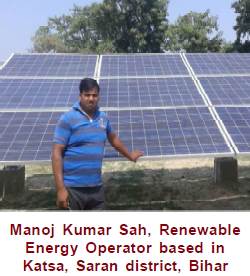Micro-Franchising for
Sustainable Rural Electrification (M-SuRE)
A
s India is growing, urban centres in the country are developing at a fast pace and their power consumption is growing at a rapid rate. The approach to meet this demand is still a conventional one by adding new generation capacities. This results in very slow change in the situation of grid connectivity of villages in the country as most of the generated power goes to urban centres.In the rural parts of India, this leaves a void in the power supply for the locals and gives opportunity to local entrepreneurs to step up to the demand and supply power through their generation equipment which are mostly diesel generators (DG). They usually supply 3 to 4 hours of electricity to local market places as well as households during the evening hours.
The existence of the Diesel Generator Operators (DGOs)
presents a great opportunity to leverage their presence in order to drive
clean energy solutions in rural India. The Climate and Development Knowledge
Network (CDKN) project – Micro-franchising for Sustainable Rural
Electrification (M-SuRE) was developed taking into consideration the
footprints of Technology and Action for Rural Advancement (TARA) in Uttar
Pradesh and Bihar. TARA experimented with various franchising approaches in
order to develop models that can be standardised and implemented for the
conversion of Diesel Generator Operators (DGOs) to Renewable Energy
Operators (REOs).

Presence of TARA’s operational unit called TARAurja as an Energy Service Company (ESCO) and its power plants in Balarampur and Shrawasti districts of Uttar Pradesh, and Saran and Gopalganj districts of Bihar helped in experimenting further with the franchising approach due to easier access to systems of TARAurja. TARAurja’s existing presence in these areas made sure that the project team got easier access to DGOs, who were more open to sharing their information.
200 villages were visited during the course of the project and close to 50 DGOs were sensitised. The following three models were developed under the project for conversion:
a) Right to Use: Under this model, the Energy Service Company (ESCO) sets the infrastructure and it enters in a long-term agreement with the DGO and this gives it the right to operate the plant and sell electricity. In return, it pays a fixed monthly amount to the ESCO. The asset ownership remains with the Master Franchisor/Third-party owner.
b) Franchisee Owned: In this model, financing is facilitated for the DGO by the Franchisor (TARA in this case). It requires the DGO/lessee to make an initial down payment and then subsequent monthly payments for the use of the asset. Support services such as load limiting devices and revenue management system are also provided. At the end of the term of the agreement, the asset ownership is fully transferred to the DGO.
c) Distribution Franchisee: This model is used to convert those DGOs who lack financial strength. In this case, the infrastructure is owned by the ESCO and the DGO is supplied using an extended line. The connection is metered and the DGO pays a monthly fee to the ESCO depending on units consumed based on the negotiated unit rates.
Under this initiative, Renewable Energy Operators (REOs) were also provided with capacity building training under which technical, financial and business management trainings were given. This imparted them the support and knowledge to run their businesses after the conversion.
Diesel Generator Operators (DGOs) were converted to Renewable Energy Operators (REOs) in Balrampur of Uttar Pradesh and Siwan and Gopalganj of Bihar. This conversion has helped in saving up to 500 litres of diesel per month and approximately 200 households and shops were provided with cleaner and more reliable source of electricity. By the end of the project, the team was able to create a pool of 15 operators who were keen on the conversion. q
Abhishek Srivastava
asrivastava1@devalt.org